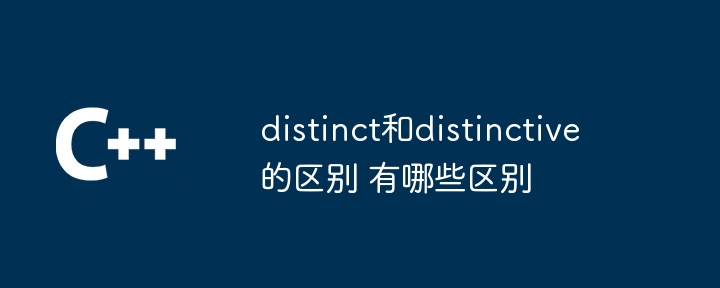Distinct emphasizes separateness, while distinctive highlights a unique quality that sets something apart.Distinct: each bird is distinct in the flock, having individual differences.Distinctive: the red bird is distinctive due to its unique red feath

Distinct vs. Distinctive: A Deep Dive into Subtle Linguistic Nuances
So, you’re wrestling with distinct and distinctive? These words are close cousins, often tripping up even seasoned writers. Let’s dissect their differences, moving beyond simple dictionary definitions to grasp their nuanced applications. By the end, you’ll not only understand the difference, but you’ll be able to wield them with precision and confidence.
The core issue lies in their emphasis: distinct focuses on separateness, while distinctive highlights a unique quality that sets something apart. Think of it like this: distinct is about being clearly different, while distinctive is about being noticeably different because of a specific characteristic.
Let’s illustrate. Imagine a flock of birds. Each bird is distinct – individually separate from the others. But if one bird has strikingly bright red feathers, that bird is distinctive due to its unique plumage. See the difference? All are distinct individuals; only the red bird is distinctive because of a specific trt.
Now, let’s explore this with some code. While these words are linguistic, we can use code to represent the conceptual difference. We’ll use Python, because, well, it’s elegant.
# Representing distinctness: Simple differentiation birds = [{"color": "blue", "size": 10}, {"color": "green", "size": 12}, {"color": "blue", "size": 11}] distinct_birds = len(set(tuple(bird.items()) for bird in birds)) #Using sets to highlight uniqueness print(f"Number of distinct birds: {distinct_birds}") #Output: 3 (all are different) # Representing distinctiveness: Highlighting a specific trait def is_distinctive(bird, flock, trait="color"): """Checks if a bird is distinctive based on a given trait.""" return bird[trait] != [b[trait] for b in flock if b != bird] red_bird = {"color": "red", "size": 10} flock = birds + [red_bird] print(f"Is the red bird distinctive by color? {is_distinctive(red_bird, flock)}") # Output: True
This code snippet, while simplified, mirrors the conceptual distinction. The distinct_birds calculation simply counts unique entities. The is_distinctive function, however, focuses on whether a specific trait makes an entity stand out from a group. This mirrors the semantic difference between the words.
Potential Pitfalls and Deeper Thoughts:
The line between distinct and distinctive can blur, leading to stylistic choices rather than grammatical errors. Overusing distinctive can sound overly emphatic. Sometimes, simple distinct conveys the meaning effectively. The best choice depends heavily on context and desired emphasis.
Furthermore, consider the underlying implication of “distinctiveness.” It often suggests a positive connotation—a desirable unique quality. Using it when descri something negative might sound jarring. For example, “a distinctive odor” implies a memorable, perhaps even pleasant, smell, while “a distinct odor” is more neutral.
Mastering the subtle distinctions between distinct and distinctive takes practice and attention to the nuances of language. By understanding their core differences and considering the contextual implications, you’ll be able to use these words with precision and finesse, elevating your writing.
以上就是distinct和distinctive的 distinct和distinctive有哪些区别的详细内容,更多请关注php中文网其它相关文章!
 微信扫一扫打赏
微信扫一扫打赏
 支付宝扫一扫打赏
支付宝扫一扫打赏

